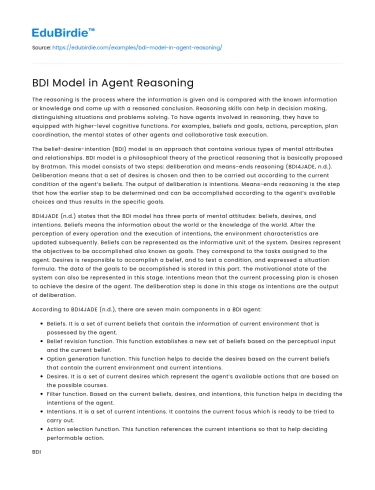The reasoning is the process where the information is given and is compared with the known information or knowledge and come up with a reasoned conclusion. Reasoning skills can help in decision making, distinguishing situations and problems solving. To have agents involved in reasoning, they have to equipped with higher-level cognitive functions. For examples, beliefs and goals, actions, perception, plan coordination, the mental states of other agents and collaborative task execution.
The belief-desire-intention (BDI) model is an approach that contains various types of mental attributes and relationships. BDI model is a philosophical theory of the practical reasoning that is basically proposed by Bratman. This model consists of two steps: deliberation and means-ends reasoning (BDI4JADE, n.d.). Deliberation means that a set of desires is chosen and then to be carried out according to the current condition of the agent’s beliefs. The output of deliberation is intentions. Means-ends reasoning is the step that how the earlier step to be determined and can be accomplished according to the agent’s available choices and thus results in the specific goals.
Save your time!
We can take care of your essay
- Proper editing and formatting
- Free revision, title page, and bibliography
- Flexible prices and money-back guarantee
BDI4JADE (n.d.) states that the BDI model has three parts of mental attitudes: beliefs, desires, and intentions. Beliefs means the information about the world or the knowledge of the world. After the perception of every operation and the execution of intentions, the environment characteristics are updated subsequently. Beliefs can be represented as the informative unit of the system. Desires represent the objectives to be accomplished also known as goals. They correspond to the tasks assigned to the agent. Desires is responsible to accomplish a belief, and to test a condition, and expressed a situation formula. The data of the goals to be accomplished is stored in this part. The motivational state of the system can also be represented in this stage. Intentions mean that the current processing plan is chosen to achieve the desire of the agent. The deliberation step is done in this stage as intentions are the output of deliberation.
According to BDI4JADE (n.d.), there are seven main components in a BDI agent:
- Beliefs. It is a set of current beliefs that contain the information of current environment that is possessed by the agent.
- Belief revision function. This function establishes a new set of beliefs based on the perceptual input and the current belief.
- Option generation function. This function helps to decide the desires based on the current beliefs that contain the current environment and current intentions.
- Desires. It is a set of current desires which represent the agent’s available actions that are based on the possible courses.
- Filter function. Based on the current beliefs, desires, and intentions, this function helps in deciding the intentions of the agent.
- Intentions. It is a set of current intentions. It contains the current focus which is ready to be tried to carry out.
- Action selection function. This function references the current intentions so that to help deciding performable action.
BDI agents can also be used to solve problems with partial information in a complex and dynamic environment. For example: The OASIS (Optimal Aircraft Sequencing using Intelligent Scheduling) air-traffic management system (Innocentini, 2017).
According to Innocentini (2017), The OASIS is tested successfully at Sydney Airport in 1995. It is implemented using PRS (Procedural Reasoning Systems). It uses multiple agents. Each agent tracks the sub-problems and communicates between each other by using asynchronous messages. The list of agents is: SEQUENCER Agent, AIRCRAFT Agent, and WIND MODEL Agent. The possible BDI example int this scenario: 1) belief (the position of the plane); 2) desire (decrease the speed of aircraft); 3) intention (adopted plan). If there are changes in the environment, the intentions are reassessed.






 Stuck on your essay?
Stuck on your essay?

